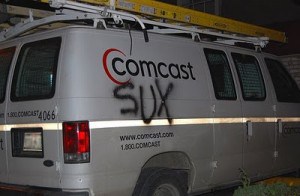Comcast’s Erroneous Billing and Collection Actions Ruin D.C. Man’s Credit, Costs Him $26,000 Penalty
 Comcast’s error correctly noting the return of a customer’s cable modem has cost a Washington, D.C. man his credit rating and $26,000 in additional mortgage fees. Now the man is suing Comcast to get his credit restored and his money back.
Comcast’s error correctly noting the return of a customer’s cable modem has cost a Washington, D.C. man his credit rating and $26,000 in additional mortgage fees. Now the man is suing Comcast to get his credit restored and his money back.
In June 2010, Marc Himmelstein bid Comcast adieu. The cable giant informed Himmelstein he was due a refund of $123.19 after the company’s equipment was removed from his home. But the company’s cable modem was left behind by mistake, costing Himmelstein $220 in unreturned equipment charges.
Himmelstein claims nobody from Comcast notified him about the missing modem, nor did he receive a bill for the difference between the equipment fee and his credit balance. He learned about his debt to Comcast when he called the company in August wondering where his refund was.
Once he discovered Comcast’s problem, Himmelstein says he returned the modem. Comcast promised to remove the unreturned equipment charge and assured him the matter was now resolved.
But Himmelstein ultimately never received his $123.19 refund. Instead, Comcast transferred his “past due” account to Credit Protection Association, which reported Himmelstein delinquent to the country’s three largest credit-reporting agencies.
That was bad timing. Himmelstein discovered Comcast’s hit on his credit in the spring of 2011, just as he was refinancing his mortgage. The mortgage lender insisted he pay an additional point in interest — $26,000 — because of the delinquent item.
Himmelstein filed a breach of contract claim and negligence against Comcast in D.C. federal court. Also named is Credit Protection Association, charged with negligence and violation of the Fair Credit Reporting Act. Himmelstein wants both companies to cover the $26,000 paid to the mortgage company, all attorney fees, and the $123.19 remaining credit balance Comcast still has not refunded.
In October, Comcast moved to dismiss all charges, and District Judge James Boasberg last week agreed to throw out claims of constructive fraud and “bad faith” breach of contract, but left the central claim of negligence stand. The case will either now proceed in court or Comcast and the collection agency will offer to settle.
Consumers canceling service should always insist on a printed receipt whenever company equipment in returned, and that receipt should be kept safe for at least six months in case of discrepancies. If an expected refund does not materialize or if a dispute arises, always write down the name of the representative spoken to on the phone or in person. Most cable companies do not refer past due accounts for outside collection activity until they are 90-120 days past due. If a collection company contacts you, demand written verification of the debt, which will force them to produce proof of the amount owed.
Lingering billing disputes should be referred to executive level customer service. Most cable operators have these specialized customer service representatives available to address red tape and special circumstances. Calling the company’s corporate office and asking to speak to the CEO will almost always get transferred to executive level customer service. Filing a complaint with the Better Business Bureau will also be answered by an executive level representative. In the case of Comcast, e-mailing [email protected] may also prove worthwhile.


 Subscribe
Subscribe
